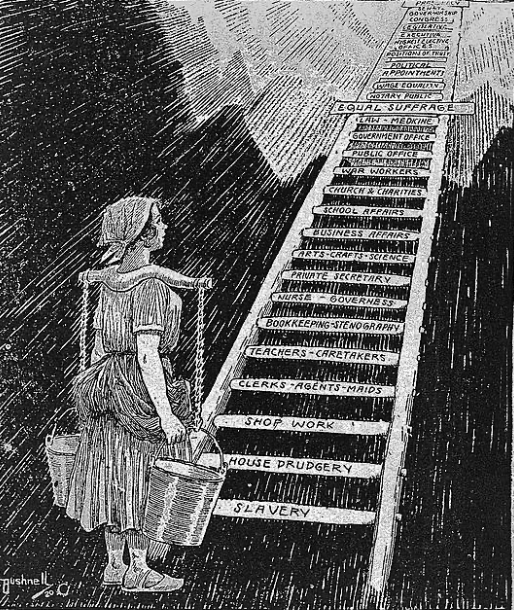- info@ghrd.org
- Mon-Fri: 10.00am - 06:00pm
The interdependent relationship between democracy and women’s rights

The interdependent relationship between democracy and women’s rights
The effect of institutions and their role on women’s rights
The long-standing struggle for women’s empowerment and gender equality is an endeavour shared by the world, regardless of culture and political situation. The degree of difficulty and seriousness of this fight may, nevertheless, be linked to the form of government that women encounter in their own countries. Consider, for instance, the shameful scandal that occurred with Roe vs. Wade, threatening to end the constitutional right to abortion, did not take place in the United States but in countries like North Korea or Afghanistan, where authoritarianism prevails. In which country would it be more possible to turn things around and ensure human rights? Despite America’s structural flaws and complex practical system, it continues to fall into the category of democratically ruled countries. It means that women and international organisations can have more hope for justice and law to be served and upheld in the United States, as the institutions envisioned by democracy work better than in many other places.
Therefore, when we look at the world from the other side of the veil, the existence of one-person or one-party authority looms like an insurmountable wall in the face of the fight for gender equality, as the effectiveness of institutions fades away. An apt example is the constant calls by world leaders, organisations, associations and many more actors for the Taliban to keep their promise to protect women’s rights when they returned to power in August 2021. Unfortunately, the clock is turning back once again for Afghan women as there is no law or democracy to rely on in the country.
Hereby, democracy appears both as the strongest ally of feminism and the most appropriate form of governance to ensure the necessary transition conditions for gender equality in a society (Alonso & Lombardo, 2018). However, before understanding the principles of democracy and how they are interdependent with women’s rights, it is important to comprehend that the more institutions lose their independence and effectiveness to political pressure, the more likely they are to slip into authoritarianism and possibly even dictatorship. In other words, “the institutional bodies mirror the relations of power” (Ruíz, 2013).
Shedding light on the intertwining of democracy and gender equality
Democracy is a form of government that is considered by many to be the ideal form for people to live in a country. This word of Greek origin is composed of the words “demos“, which means “people”, and “kratos“, which means “power” or “rule” (Dahl, N.D). This conceptualisation makes it possible for us to comprehend what democracy is in the simplest and shortest way by looking only at its origins.
Still, it has never been possible to acquire democracy under a single concept. Democracy is divided into different forms;
1. Citizens can have direct power to decide the laws by vote, under which they will live without having elected representatives as proxies; i.e. direct democracy;
2. Or, by elected officials, chosen by the citizens themselves, who will vote on behalf of their constituents, which is called representative democracy (Dahl, N.D).
Yet, even these two concepts diverge into sub-forms among themselves, according to the procedure and cultural history of the countries. Therefore, these definitions are only the tip of the iceberg for understanding democracy and its intertwined relationship with gender equality.
There are many basic principles that we can identify in order to have a democratic society. “Participation of citizens”, “equality”, and “control over the abuse of power” are the three principles we can examine in this article to shed light on the topic (Day, 2022).
-
Participation of citizens, equality and control over the abuse of power: from the process of democratisation to the empowerment of women
Women’s rights or, more generally, gender equality, refers to the state of having equal opportunities and rights in any subjects and fields. Accordingly, one of the obligations that the democratic system must provide is equal treatment (Day, 2022). Hence, democracy presupposes equality and thus opposes discrimination based on ethnicity, religion, gender or sexual orientation. This means refusing any form of subjugation to women, contrary to what the patriarchal system imposes (Day, 2022). Thus, in a democratically governed country, women cannot be prevented from exercising their democratic rights due to their gender. When the Taliban, for instance, barred girls under sixth grade from attending school solely on the grounds of their gender on March 23rd, 2022, we once again witnessed a blow to the principles of democracy and, correlatively, to women’s rights in Afghanistan (Belquis & Asma, 2022).
Furthermore, the status of equality encompasses economic and social as well as political rights. Equal access to the right to vote and the free exercise of rights is one of the main references to this concept. For instance, as women gradually gained the right to vote around the world, “the expansion of women’s rights has gone hand-in-hand with the establishment of democracy, and women have played a key role in the transition from authoritarianism to democracy” (Moghadam, 2008). Therefore, granting women’s suffrage, like in Argentina and Turkey, has played an important role in the democratisation process of the socio-political order in these countries (Moghadam, 2008). In other words, it triggered a positive butterfly effect with this groundbreaking initiative at the time.
“The sky is now her limit”. Source: Library of Congress/ Bushnell, Elmer Andrews, 1920.

Argentina gave women the right to vote during Juan Peron’s first government in 1947. As a result, the equality and participation of citizens, which are the basic principles of democracy, were improved and advanced in the country (Johnson, 2021). After this date, women’s participation in politics was supported and even pioneered reforms (Hammond, 2009). Turkey, on the other hand, was living its “revolutionary time” with the establishment of the Turkish Republic in 1923, thanks to Mustafa Kemal Atatürk, despite the difficulties of the period. Thus, Turkish women gained the right to vote and be elected, first in municipalities in 1930 and the general elections four years later (Ayyildiz, 2004).
Consequently, “these processes are closely intertwined and indeed mutually dependent: the fate of democratisation is bound to the fate of women’s rights and vice versa. Separating the two is conceptually muddled as well as politically dangerous” (Moghadam, 2008). To go even further in the case of Afghanistan, before the Taliban came to power in 1996, Afghan women went through a series of liberal reforms to bolster their participation in a wide range of fields, from the arts to politics (Osman & Zeweri, 2021). Moreover, with the ratification of the Equal Rights Amendment Act in the Afghan Constitution in 1964, women began to demand more rights (Osman & Zeweri, 2021). Yet, when the Taliban came to power in the country in 1996, the struggle for gender equality that had been successful over the past years, including women’s suffrage, was revoked by the Islamist group. Fortunately, in 2002, after the fall of the Taliban in 2001, Afghan women regained the right to vote and be elected again, with the end of repressive Islamic authoritarianism in the country (Osman & Zeweri, 2021).
Before jumping to controlling the abuse of power, in the light of the principle of “governance and power of the people”, to which the very name of democracy refers to, the participation of the citizens is one of the essential constituent elements of this form of government. Nevertheless, this cornerstone is a situation that will not occur with the participation of less than half of the society but entirely. Thus, “the quality of democracy is determined not only by the form of institutions, but also by the extent that different social groups participate in these institutions” (Moghadam, 2008). Furthermore, this level can only be reached by ensuring that women get to the place they deserve instead of being excluded from society and having the same opportunities and rights as any man. Societies that were once authoritarian should be pushed more to accept the presence and participation of women in order to break the stigma and stereotypes labelled by the populist and dangerous politicians who once abused their power.
So the danger also lies in the loss of control over institutions and politicians and thus in the abuse of power. If a government seeks to act above the law or if the judiciary is seen as everything other than independent, democracy cannot be assessed in a country. That is, “when the levers of the State are moved to favour only a certain segment of society at the expense of others” (Day, 2022). For instance, abortion and reproductive rights are critical subjects exposed to populist rhetoric in de-democratisation processes. Even with enacted laws, women are still not safe when the situation comes down to their bodily rights in many countries. Politicians and even the judiciary itself are going above the law and abusing their power to prevent women from exercising their most basic right. Poland, in this case, can be considered an apt example. Even though it is located in Europe and is a Member State of the European Union along with 26 others, it has become an undemocratic country due to the right-wing government’s abuse of power which ultimately caused the destruction of the once-independent judiciary (Marques, 2022). This led to the brutal decision of the Polish Constitutional Tribunal on October 22nd, 2020, ruling that “abortion on grounds of severe and irreversible fetal defect or incurable illness that threatens the fetus’ life was unconstitutional” (Amnesty International, 2022). Thus, the process of de-democratisation and the rise of populism have correlatively increased the oppression of women’s rights. Faced with the utterly inconceivable news, “both the European Court of Human Rights and the European Commission have found that the Constitutional Tribunal does not meet fair trial requirements due to its lack of independence from the legislative and the executive powers” (Amnesty International, 2022).
Conclusion
As Valentine M. Moghadam (2008), the chief of the section for Gender Equality and Development in the sector of Social and Human Sciences at UNESCO in Paris said: “Women may need democracy in order to flourish, but the converse is also true: democracy needs women if it is to be an inclusive, representative, and enduring system of government”. Hereof, democracy is a necessary form of government for women to have the equality they deserve in society and live free from discrimination and oppression by the system. However, when institutions and religion are subjected to the manipulative game of politics, the system favours privileged male groups, which means a constant threat to the voices and even the existence of women.
Moreover, women have been and continue to be the key players in advancing and developing democracy and cultural changes in societies. In a democratic country, everyone is treated equally, and the rule of law is ensured within the framework of respect for human rights. For this reason, gender equality deeply seeks democracy to continue the process of women’s empowerment in political, civil, economic and social rights.
References
Amnesty International. (2022, January 26). Poland: Regression on abortion access harms women. Retrieved 26 May 2022, from https://www.amnesty.org/en/latest/news/2022/01/poland-regression-on-abortion-access-harms-women/.
Alonso A. & Lombardo E. (2018, September 14). Gender Equality and De-Democratization Processes: The Case of Spain. Cogitatio. Retrieved 22 May 2022, from https://www.cogitatiopress.com/politicsandgovernance/article/viewFile/1419/1419.
Belquis A. & Asma E. (2022, April 1). Taliban’s Ban on Girls’ Education in Afghanistan. United States Institute of Peace. Retrieved 22 May 2022, from https://www.usip.org/publications/2022/04/talibans-ban-girls-education-afghanistan.
Dahl A. R. (n.d). Democracy. Britannica. Retrieved 22 May 2022, from https://www.britannica.com/topic/democracy.
Day J. (2022, April 12). 14 Principles of Democracy. Liberties. Retrieved 21 May 2022, from https://www.liberties.eu/en/stories/principles-of-democracy/44151.
Hammond G. (2009, January 1). Suffrage in San Juan: The Test of Women’s Rights in Argentina. JSTOR. Retrieved 26 May 2022, from https://www.jstor.org/stable/27734103.
Johnson J. (2021, April 1). 5 FACTS ABOUT WOMEN’S RIGHTS IN ARGENTINA. The Borgen Project. Retrieved 25 May 2022, from https://borgenproject.org/womens-rights-in-argentina/.
Ayyildiz J. (2004, December 5). THE CONTRIBUTION OF TURKISH WOMEN TO THE MODERNIZATION OF TURKEY. Atatürk Society of America. Retrieved 7 June 2022, from http://www.ataturksociety.org/the-contribution-of-turkish-women-to-the-modernization-of-turkey/.
Marques F. C. (2022, May 5). Abortion Rights Falter as Democracy Slides. Bloomberg. Retrieved 26 May 2022, from https://www.bloomberg.com/opinion/articles/2022-05-05/abortion-rights-falter-as-democracy-slides.
Moghadam M. V. (2008, August 20). The Gender of Democracy: The Link Between Women’s Rights and Democratization in the Middle East. Carnegie Endowment For International Peace. Retrieved 22 May 2022, from https://carnegieendowment.org/sada/21226.
Osman W. & Zeweri H. (2021, October 11). Afghan women have a long history of taking leadership and fighting for their rights. The Conversation. Retrieved 26 May 2022, from https://theconversation.com/afghan-women-have-a-long-history-of-taking-leadership-and-fighting-for-their-rights-167872.
Ruíz J. F. (2013, September 24). Power, Gender and Democracy. From Domination to Gender Equality. Scielo. Retrieved 22 May 2022, from http://www.scielo.org.co/pdf/recig/v11n12/v11n12a06.pdf.
Search
ABOUT US
Global Human Rights Defence (GHRD) is a dedicated advocate for human rights worldwide. Based in The Hague, the city of peace and justice. We work tirelessly to promote and protect the fundamental rights of individuals and communities. Our mission is to create a more just and equitable world, where every person's dignity and freedoms are upheld. Join us in our journey towards a brighter future for all.
ALL CONTACTS
-
Riviervismarkt 5-unit 2.07
2513 AM The Hague - Phone +31 62 72 41006
- info@ghrd.org
-
10:00am - 06:00pm
Saturday & Sunday Closed
SUBSCRIBE
Stay informed and be part of change - Subscribe to our newsletter today!
- Copyright of GHRD 2023. Powered by Desmantle Studio.


Leave a Reply